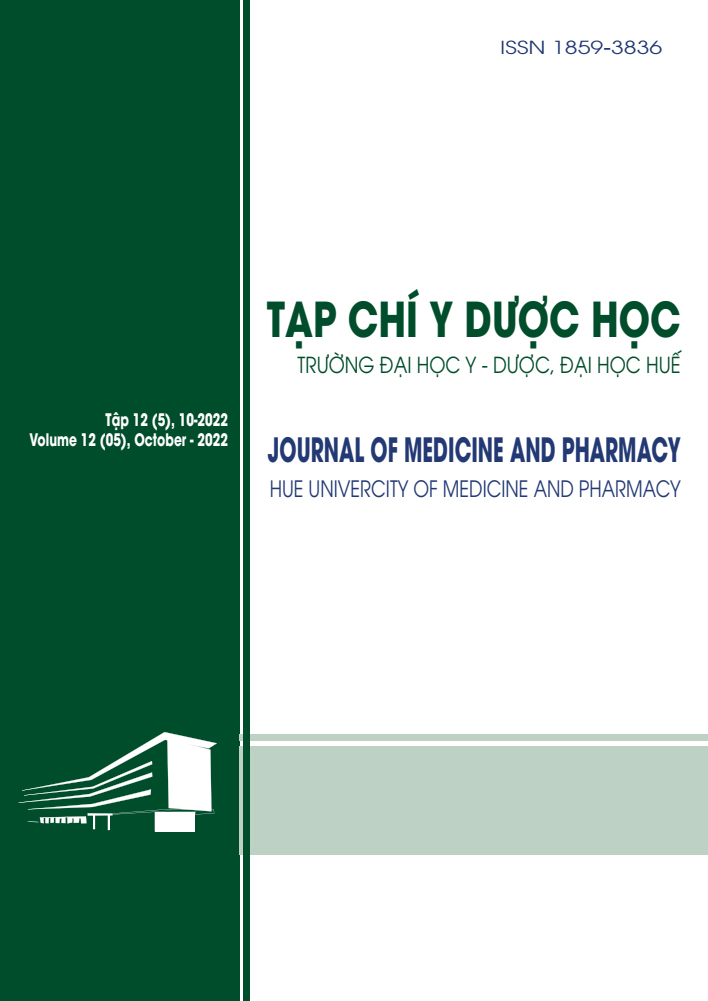Tóm tắt
Đặt vấn đề: Đề tài này nhằm hai mục tiêu: (1) Xác định đột biến gene KRAS của ctDNA (mutKRAS ctDNA) ở bệnh nhân ung thư tuỵ và các bệnh lý tuỵ lành tính bằng kỹ thuật ddPCR. (2) Khảo sát mối liên quan của mutKRAS ctDNA và giai đoạn lâm sàng ung thư tuỵ.
Đối tượng và phương pháp nghiên cứu: 49 bệnh nhân ung thư tuỵ và 47 bệnh nhân bệnh tuỵ lành tính được xác định mutKRAS ctDNA bằng kỹ thuật ddPCR.
Kết quả: Tỷ lệ bệnh nhân mutKRAS ctDNA (+) trong nhóm ung thư tuỵ là 69,4%, cao hơn nhóm u nang tuỵ lành tính (21,1%) và viêm tuỵ mạn (7,1%), p<0,0001. Tỷ lệ allele đột biến (MAF) của KRAS trong ctDNA có mối liên quan với giai đoạn lâm sàng ung thư tuỵ, MAF trung bình của nhóm giai đoạn IV là 8,4 ± 12,2%, cao hơn nhóm giai đoạn III (2,8 ± 2,4%) và giai đoạn I-II (1,1 ± 1,6%). MAF có giá trị tiên lượng ung thư tuỵ giai đoạn IV với ngưỡng trên 5,55%, diện tích dưới đường cong ROC là 0,739, p=0,019.
Kết luận: ddPCR phát hiện tỷ lệ cao bệnh nhân ung thư tuỵ có mutKRAS ctDNA. KRAS MAF có giá trị tiên lượng tiến triển nặng của bệnh
| Đã xuất bản | 24-04-2025 | |
| Toàn văn |
|
|
| Ngôn ngữ |
|
|
| Số tạp chí | Tập 15 Số 1 (2025) | |
| Phân mục | Nghiên cứu | |
| DOI | 10.34071/jmp.2025.1.12 | |
| Từ khóa | ung thư tuỵ, ddPCR, KRAS, ctDNA pancreatic cancer, ddPCR, KRAS, ctDNA |

công trình này được cấp phép theo Creative Commons Attribution-phi thương mại-NoDerivatives 4.0 License International .
Bản quyền (c) 2025 Tạp chí Y Dược Huế
Bailey P, Chang DK, Nones K, Johns AL, Patch AM, Gingras MC, et al. Genomic analyses identify molecular subtypes of pancreatic cancer. Nature. 2016 Mar 3;531(7592):47–52.
Yadav DK, Bai X, Yadav RK, Singh A, Li G, Ma T, et al. Liquid biopsy in pancreatic cancer: the beginning of a new era. Oncotarget. 2018;9(42):26900–33.
Buscail L, Bournet B, Cordelier P. Role of oncogenic KRAS in the diagnosis, prognosis and treatment of pancreatic cancer. Nat Rev Gastroenterol Hepatol. 2020 Mar 1;17(3):153–68.
Wang ZY, Ding XQ, Zhu H, Wang RX, Pan XR, Tong JH. KRAS Mutant Allele Fraction in Circulating Cell-Free DNA Correlates With Clinical Stage in Pancreatic Cancer Patients. Front Oncol. 2019 Nov 29;9:1295.
Qi T, Pan M, Shi H, Wang L, Bai Y, Ge Q. Cell-Free DNA Fragmentomics: The Novel Promising Biomarker. Int J Mol Sci. 2023 Jan 1;24(2):1503.
Diaz LA, Bardelli A. Liquid biopsies: Genotyping circulating tumor DNA. Journal of Clinical Oncology. 2014 Feb 20;32(6):579–86.
Kim MK, Woo SM, Park B, Yoon KA, Kim YH, Joo J, et al. Prognostic Implications of Multiplex Detection of KRAS Mutations in Cell-Free DNA from Patients with Pancreatic Ductal Adenocarcinoma. Clin Chem. 2018 Apr 1;64(4):726–34.
Gardner TB, Adler DG, Forsmark CE, Sauer BG, Taylor JR, Whitcomb DC. ACG Clinical Guideline: Chronic Pancreatitis. American Journal of Gastroenterology. 2020 Mar 1;115(3):322–39.
Shimizu K, Ito T, Irisawa A, Ohtsuka T, Ohara H, Kanno A, et al. Evidence-based clinical practice guidelines for chronic pancreatitis 2021. J Gastroenterol. 2022 Oct 1;57(10):709–24.
Anaizi A, Hart PA, Conwell DL. Diagnosing Chronic Pancreatitis. Dig Dis Sci. 2017 Jul 1;62(7):1713–20.
Amin MB, Edge SB, Greene FL, Byrd DR, Brookland RK, Washington MKay, et al. AJCC Cancer Staging Manual. 8th edition. New York: Springer; 2017.
Watanabe F, Suzuki K, Tamaki S, Abe I, Endo Y, Takayama Y, et al. Longitudinal monitoring of KRAS-mutated circulating tumor DNA enables the prediction of prognosis and therapeutic responses in patients with pancreatic cancer. PLoS One. 2019 Dec 1;14(12):e0227366.
Moshayedi N, Escobedo AL, Thomassian S, Osipov A, Hendifar AE. Race, sex, age, and geographic disparities in pancreatic cancer incidence. Journal of Clinical Oncology. 2022 Feb 1;40(4_suppl):520–520.
Gehrels AM, Wagner AD, Besselink MG, Verhoeven RHA, van Eijck CHJ, van Laarhoven HWM, et al. Gender differences in tumor characteristics, treatment allocation and survival in stage I–III pancreatic cancer: a nationwide study. Eur J Cancer. 2024 Jul 1;206:114117.
Samaan JS, Abboud Y, Oh J, Jiang Y, Watson R, Park K, et al. Pancreatic Cancer Incidence Trends by Race, Ethnicity, Age and Sex in the United States: A Population- Based Study, 2000–2018. Cancers (Basel). 2023 Feb 1;15(3):870.
Huerta M, Roselló S, Sabater L, Ferrer A, Tarazona N, Roda D, et al. Circulating tumor dna detection by digital-droplet PCR in pancreatic ductal adenocarcinoma: A systematic review. Cancers (Basel). 2021 Mar 1;13(5):1–14.
Hadano N, Murakami Y, Uemura K, Hashimoto Y, Kondo N, Nakagawa N, et al. Prognostic value of circulating tumour DNA in patients undergoing curative resection for pancreatic cancer. Br J Cancer. 2016 Jun 28;115(1):59–65.
Earl J, Garcia-Nieto S, Martinez-Avila JC, Montans J, Sanjuanbenito A, Rodríguez-Garrote M, et al. Circulating tumor cells (Ctc) and kras mutant circulating free Dna (cfdna) detection in peripheral blood as biomarkers in patients diagnosed with exocrine pancreatic cancer. BMC Cancer. 2015 Oct 24;15(1):797.
Yang F, Li L, Kong XY. The Positive Feedback Loop Between Inflammation and Mutant KRAS Genes Promotes Malignant Transformation in Chronic Pancreatitis. Cancer Screening and Prevention. 2022 Dec 2;1(1):39–46.
Cheng H, Luo G, Jin K, Fan Z, Huang Q, Gong Y, et al. Kras mutation correlating with circulating regulatory T cells predicts the prognosis of advanced pancreatic cancer patients. Cancer Med. 2020 Mar;9(6):2153–9.







